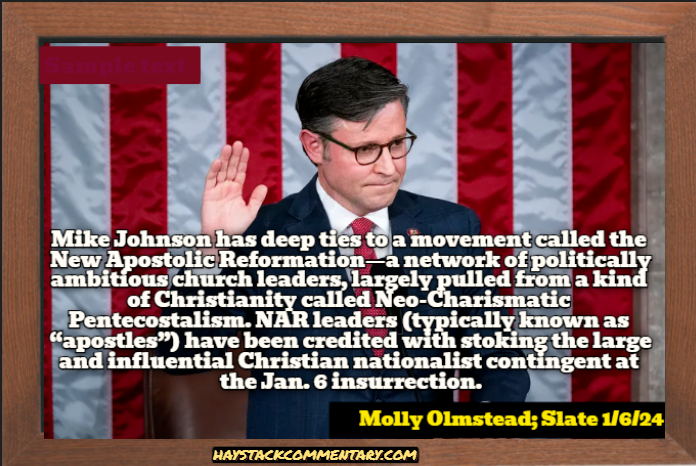What is Christian nationalism and why it raises concerns about threats to democracy
White Christian nationalism has been in the headlines quite a lot as of late. Brad Onishi is a former evangelical minister who once identified as a Christian nationalist himself. He left the church in 2005 and began studying religion and extremism. Laura Barrón-López spoke with Onishi to better understand the concept and its reach in American society and politics. (PBS 2/1/24) READ MORE>>>>>
White Christian nationalism has been in the headlines quite a lot as of late. Brad Onishi is a former evangelical minister who once identified as a Christian nationalist himself. He left the church in 2005 and began studying religion and extremism. Laura Barrón-López spoke with Onishi to better understand the concept and its reach in American society and politics. (PBS 2/1/24) READ MORE>>>>>
In 2016, he said, “You know, we don’t live in a democracy . . . It’s a constitutional republic. And the founders set that up because they followed the biblical admonition on what a civil society is supposed to look like.” And very worrying to those of us who find the separation of church and state crucial to the political operation of the United States, he added: “Over the last 60 or 70 years our generation has been convinced that there is a separation of church and state . . . most people think that is part of the Constitution, but it’s not.” |
Jesus was not the new Moses. That would be Mike Johnson
As reported previously at OnlySky, Mike Johnson, the Republican speaker of the House of Representatives, is overtly and explicitly a Christian nationalist. With Johnson, there is no separation of church and state. Previously in congressional politics, there has been at least the appearance of some distance between lawmakers and Christian nationalists who openly support them. The politicians have paid lip service to those who openly advocate for theocracy, but the distance between them has been enough to allow the lawmakers to go about their business in at least a somewhat democratic manner. But the situation in Congress presently is very different. Mike Johnson is not some distant theocratic thinker or religious figure shouting from the sidelines or bending the occasional lawmaker’s ear. He is the Speaker. (Jonathan Ms Pearce/Only Sky 1/2/24) READ MORE>>>>> |
How religion and politics will mix in 2024 – three trends to track
Religion is likely to play a big role in voters’ choices in the 2024 presidential election – much as it did in previous years. Despite an overall shift away from participation in organized religion in the U.S. populace, religious rhetoric in the political arena has intensified. In the 2016 race, evangelical voters contributed, in part, to Republican nominee Donald Trump’s victory. Those Americans who identified as “weekly churchgoers” not only showed up at the polls in large numbers, but more than 55% of them supported Trump. His capture of 66% of the white evangelical vote also tipped the scales in his favor against his Democratic rival, Hillary Clinton. (Tobin Miller Shearer/Yahoo 1/3/24) READ MORE>>>>>
Religion is likely to play a big role in voters’ choices in the 2024 presidential election – much as it did in previous years. Despite an overall shift away from participation in organized religion in the U.S. populace, religious rhetoric in the political arena has intensified. In the 2016 race, evangelical voters contributed, in part, to Republican nominee Donald Trump’s victory. Those Americans who identified as “weekly churchgoers” not only showed up at the polls in large numbers, but more than 55% of them supported Trump. His capture of 66% of the white evangelical vote also tipped the scales in his favor against his Democratic rival, Hillary Clinton. (Tobin Miller Shearer/Yahoo 1/3/24) READ MORE>>>>>
To affirm all these truths is not political talk; it is simply the truth. To deny these truths isn’t a political perspective; it is dishonesty. No church folk should participate in, promote or enlarge dishonesty, especially the kind that destroys lives, demonizes others and kills people. |
Silence is not an option for the church on January 6
The church should not remain silent when January 6 rolls around. It was an insurrection. It was incited. It was planned. It was intended. It was a response to a dastardly lie. Trump did lose. Biden did win. People did die. Police officers were assaulted. Some did die as a result of the assault. People did desecrate and vandalize the Capitol. People did go in search of Mike Pence, shouting, “Hang Mike Pence!” They did erect gallows. People did search for Nancy Pelosi to harm or kill her. People did “baptize” these atrocious acts with “prayer” in the name of Jesus. Our democracy, republic, and democratic republic did become endangered, and do remain endangered. Someone did cause all of this. That someone was encouraged, enabled, and supported in many ways, by other powerful people who could and should have disabled or otherwise stop that someone; and so this was not the deed of only one man. (Michael PL Friday/Baptist News Global 1/5/24) READ MORE>>>>> |
|
The Radical Evangelicals Who Helped Push Jan. 6 to Wage War on “Demonic Influence” It’s been three years since the Jan. 6 Capitol riot, and much of the initial public horror at the violence has faded, at least on the right. Polling has found Republicans less and less likely to view the Jan. 6 rioters as “violent”; most now think it’s “time to move on.” Some of the insurrectionists have even become martyrs or folk heroes. And, perhaps most tellingly, the new speaker of the House, Mike Johnson, was considered one of the primary architects behind the Stop the Steal movement. Johnson’s more genteel way of politics may not fit with the image of a rabid crowd storming the Capitol, but he does have something in common with many of the Jan. 6ers: a profound religious conviction in his own cause. In many ways, Johnson seems like a classic leader of the Christian right. His legal career focused on elevating protections for “religious liberty” over the rights of the LGBTQ community. At a more personal level, he hits the traditional cultural markers, taking, for example, his commitments to marriage and avoiding porn to extremes. Scholars of the Christian right have characterized him as a textbook Christian nationalist. (Molly Olmstead/Slate 1/6/24) READ MORE>>>>> |
These post-January 6 myths are not new. They began on January 6, 2021. Like Sen. Josh Hawley, photographed with fist raised towards the mob, or later that evening, Sen. Matt Gaetz arguing baseless conspiracy theories on the House floor claiming that AntiFa was to blame. Though the Presidential election was ultimately certified on January 6, democracy in its aftermath has largely failed to halt the spread and intensification of this ideology. |
How We Can Confront the Myths of January 6 and Intensifying Christian Nationalism
Former President Trump’s third campaign for the Presidency is promising retribution against domestic enemies, while also holding double digit leads in key primary states. But the two are related. As the nation marks the third anniversary of the January 6 attacks, new research suggests Trump’s increasingly brazen authoritarianism is in step with intensifying Christian nationalism among parts of the American public. Recent survey data of the American public highlights the intensification of key elements associated with Christian nationalism—a political theology that idealizes and advocates for a fusion of a particular expression of Christianity with American civic life. Specifically, studies find Americans who embrace Christian nationalism post-January 6 support the use of political violence in order to “save our country,” support political leaders who are willing to “break some rules if that’s what it takes to set things right,” support for the false claim that the 2020 election was “rigged,” and a decreasing desire to prosecute rioters at the Capitol on January 6th. (Jared Stacy/MSN 1/7/24) READ MORE>>>>> |
Z-NOTE: January 8, 2024:
 Zorek Richards
Zorek Richards
The kingdom of God focuses on the advancement of the gospel. Nationalism focuses on the advancement of the politics of the nation.
The kingdom of God focuses on the advancement of the gospel. Nationalism focuses on the advancement of the politics of the nation. As much as I believe politics and economics are vital and, to an extent, can represent biblical ethics, I am much more committed to making disciples and seeing humanity change. (It is also possible for a committed Christian to be a faithful witness for Jesus while serving in public life as an elected official.) For me, anything that potentially distracts my energy and focus away from advancing the Gospel takes a backseat in my personal life and ministry.
The kingdom of God produces loyalty to Christ above all else. Nationalism produces loyalty to the nation above all else.
The kingdom of God produces martyrs for the cause of Christ. Nationalism produces citizens who are willing to die for their nation.
The kingdom of God raises the banner of Jesus above all else. Nationalism raises the national flag above all else.
The kingdom of God promotes the interests of God above the world. Nationalism promotes the interests of the nation above the kingdom.
“His soul hates the wicked and the one who loves violence” (Psalm 11:5).
Solomon instructed us, “Do not envy a man of violence and do not choose any of his ways” (Proverbs 3:31).
The kingdom of God focuses on the advancement of the gospel. Nationalism focuses on the advancement of the politics of the nation. As much as I believe politics and economics are vital and, to an extent, can represent biblical ethics, I am much more committed to making disciples and seeing humanity change. (It is also possible for a committed Christian to be a faithful witness for Jesus while serving in public life as an elected official.) For me, anything that potentially distracts my energy and focus away from advancing the Gospel takes a backseat in my personal life and ministry.
The kingdom of God produces loyalty to Christ above all else. Nationalism produces loyalty to the nation above all else.
The kingdom of God produces martyrs for the cause of Christ. Nationalism produces citizens who are willing to die for their nation.
The kingdom of God raises the banner of Jesus above all else. Nationalism raises the national flag above all else.
The kingdom of God promotes the interests of God above the world. Nationalism promotes the interests of the nation above the kingdom.
“His soul hates the wicked and the one who loves violence” (Psalm 11:5).
Solomon instructed us, “Do not envy a man of violence and do not choose any of his ways” (Proverbs 3:31).
Christians Against Christian Nationalism translates TikTok activism to local politics
(RNS) — Standing outside the U.S. Capitol on Jan. 6, 2023, Georgia McKee witnessed two very different responses on the second anniversary of the infamous mob attack. Circled together and holding candles, one group of faith leaders condemned Christian nationalism, calling it a “poisonous ideology” and “gross distortion of our Christian faith.” The other group marched in front of the Supreme Court building, shouting into megaphones, wearing MAGA hats, waving American flags and holding signs saying, “One Nation Under God.”
(Kathryn Post/Religion News Service 1/8/24) READ MORE>>>>>
(RNS) — Standing outside the U.S. Capitol on Jan. 6, 2023, Georgia McKee witnessed two very different responses on the second anniversary of the infamous mob attack. Circled together and holding candles, one group of faith leaders condemned Christian nationalism, calling it a “poisonous ideology” and “gross distortion of our Christian faith.” The other group marched in front of the Supreme Court building, shouting into megaphones, wearing MAGA hats, waving American flags and holding signs saying, “One Nation Under God.”
(Kathryn Post/Religion News Service 1/8/24) READ MORE>>>>>
"Not just about going viral": Christians Against Christian Nationalism translates TikTok activism to local politics
Standing outside the US Capitol on 6th January, 2023, Georgia McKee witnessed two very different responses on the second anniversary of the infamous mob attack. Circled together and holding candles, one group of faith leaders condemned Christian nationalism, calling it a “poisonous ideology” and “gross distortion of our Christian faith". The other group marched in front of the Supreme Court building, shouting into megaphones, wearing MAGA hats, waving American flags and holding signs saying, “One Nation Under God". (Kathryn Post/Sight 1/10/24) READ MORE>>>>>
Standing outside the US Capitol on 6th January, 2023, Georgia McKee witnessed two very different responses on the second anniversary of the infamous mob attack. Circled together and holding candles, one group of faith leaders condemned Christian nationalism, calling it a “poisonous ideology” and “gross distortion of our Christian faith". The other group marched in front of the Supreme Court building, shouting into megaphones, wearing MAGA hats, waving American flags and holding signs saying, “One Nation Under God". (Kathryn Post/Sight 1/10/24) READ MORE>>>>>
 Fred Opalinski
Fred Opalinski
A recently broadcast comment by an Iowa voter chilled me to the bone. When asked about former President Donald Trump’s indictments, she responded, “My savior Jesus Christ was also convicted, but he was innocent and died for my sins.”
I find this comparison to be theologically bewildering and politically dangerous. She is evidence of a rising wave of Christian nationalism, which I consider horrifying.
Our nation’s founders realized the danger of mixing religious fervor with political power. Europe was filled with bloody examples: the Crusades, the Inquisition, colonial oppression and forced conversions, trials and executions, and gory more.
I find this comparison to be theologically bewildering and politically dangerous. She is evidence of a rising wave of Christian nationalism, which I consider horrifying.
Our nation’s founders realized the danger of mixing religious fervor with political power. Europe was filled with bloody examples: the Crusades, the Inquisition, colonial oppression and forced conversions, trials and executions, and gory more.
There is a reason that the words “Jesus,” “Christian” or “church” appear nowhere in our founding documents. Seeing any political figure as savior or redeemer elevates him/her to a status only God can occupy. Devotion to such a figure is a perversion of faith and a threat to anyone who disagrees with it.
If this becomes a dominant movement in our country, it threatens to destroy the freedom of religion that has been a pillar of our greatness. God help us. --Rev. Fred Opalinski; Reading Eagle; Christian nationalism defies nation’s creed 1/15/24
If this becomes a dominant movement in our country, it threatens to destroy the freedom of religion that has been a pillar of our greatness. God help us. --Rev. Fred Opalinski; Reading Eagle; Christian nationalism defies nation’s creed 1/15/24
Destroying The Golden Idol of Christian Nationalism
Watching the collective soul-selling of my fellow Christians here in America over the past eight years has been something that has grieved me more than I can measure or accurately describe. Particularly disheartening has been watching ancient religious history repeating, and worse: to realize that nearly every national sickness here in America, from the violent parade of white nationalism to the defiant anti-mask pandemic-deniers to the propagators of an abject election fraud lie to the suppressors of the voices and votes of people of color—is coming from professed Christians. As someone still aspiring to a life of faith and still trying to speak into my religious tradition, it’s sobering to admit that we’re not here as a nation in this brutal battle for disparate humanity and we’re not steeped in this unapologetic supremacy, if not for people claiming to be devoted to the same Jesus I’ve grown up trying to emulate. (John Pavlovitz 1/19/24) READ MORE>>>>>
Watching the collective soul-selling of my fellow Christians here in America over the past eight years has been something that has grieved me more than I can measure or accurately describe. Particularly disheartening has been watching ancient religious history repeating, and worse: to realize that nearly every national sickness here in America, from the violent parade of white nationalism to the defiant anti-mask pandemic-deniers to the propagators of an abject election fraud lie to the suppressors of the voices and votes of people of color—is coming from professed Christians. As someone still aspiring to a life of faith and still trying to speak into my religious tradition, it’s sobering to admit that we’re not here as a nation in this brutal battle for disparate humanity and we’re not steeped in this unapologetic supremacy, if not for people claiming to be devoted to the same Jesus I’ve grown up trying to emulate. (John Pavlovitz 1/19/24) READ MORE>>>>>


